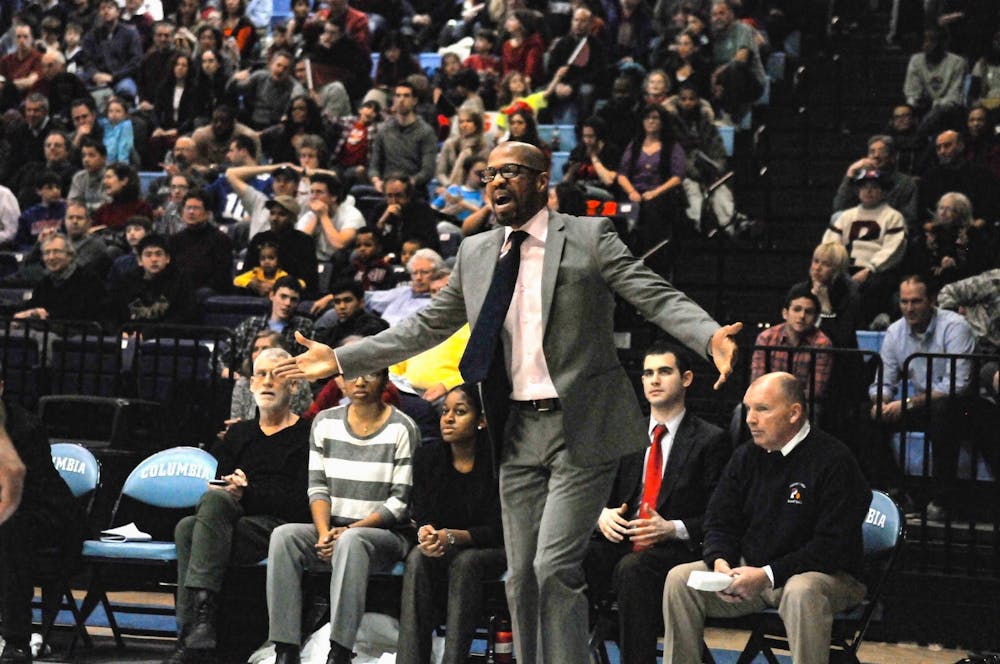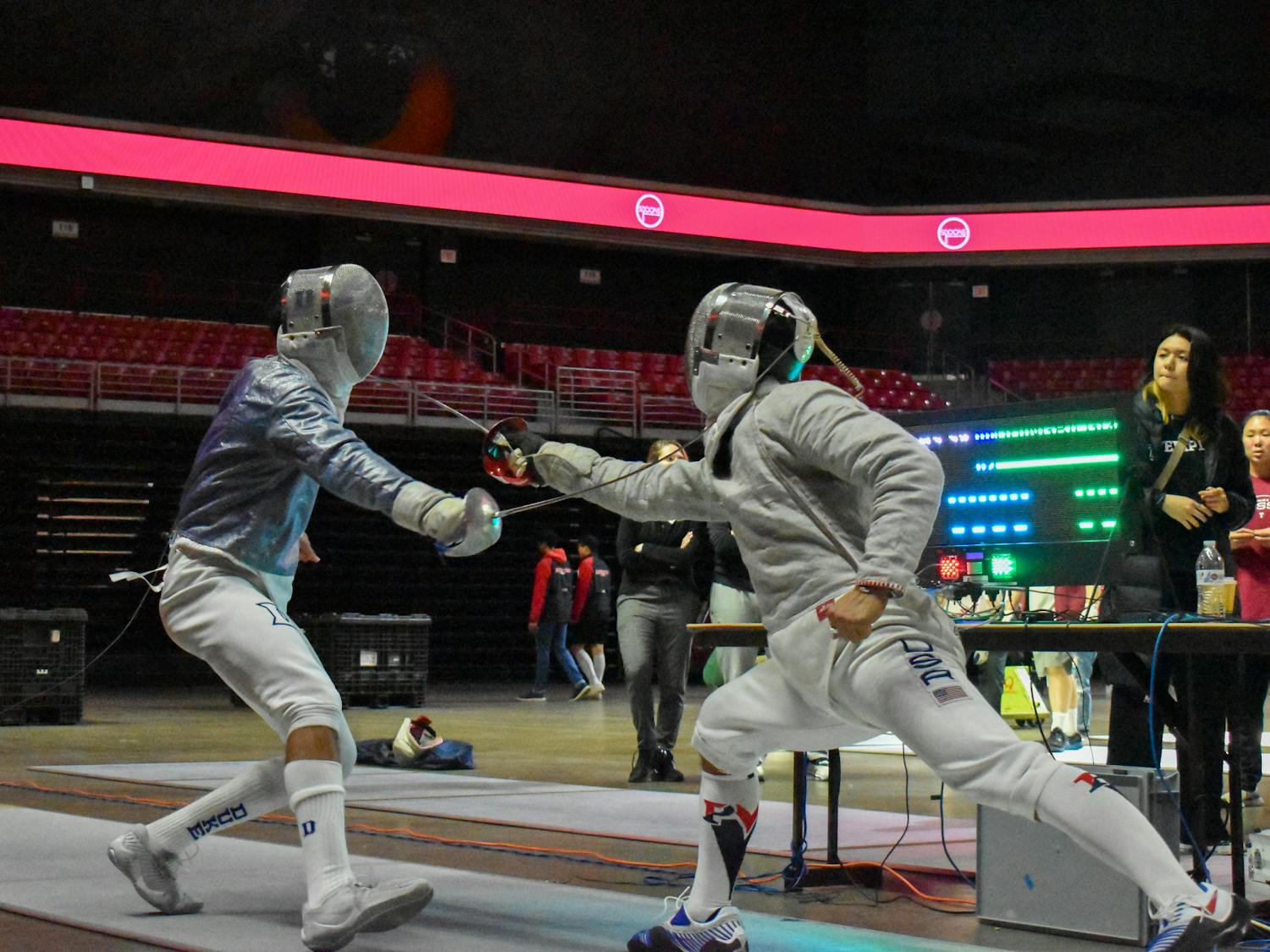After creating a Penn men’s basketball all-time starting five, with so many talented players coming through the program over the decades, it only makes sense to present a second (small-ball) lineup that is arguably as good as or better than the first.
Guard — Tony Price (1976-79)
Starting off the list is Tony Price, a player who became an unforgettable member of the Penn men's basketball community. By the end of his career, Price led Penn in all-time assists as well as steals. He is also second in program history in points scored in a season.
He was named first team All-Ivy twice, and won Ivy League Player of the Year in his senior season, averaging 19.8 points per game and 8.7 rebounds per game, but neither of those accolades was the highlight of his career.
In 1979, Price helped lead the Quakers to the Final Four; the furthest that Penn has ever made it in the NCAA Tournament. The other teams left in the tournament were led by future Hall of Famers Larry Bird (Indiana State) and Magic Johnson (Michigan State). Penn fell to the Spartans at the last hurdle before the title game and lost to DePaul in the third-place matchup. Coming in as a No. 9 seed, high-scoring performances by Price in addition to strong-free throw shooting led the Red and Blue to upsets over No. 8 Iona, top-seeded North Carolina, and No. 4 Syracuse.
After his career at Penn, Price was drafted 29th overall by the Detroit Pistons, but was waived before he could play a game; he was able to get some exposure with the San Diego Clippers but failed to make a significant impact in the NBA.
Guard — Jerome Allen (1991-95)
Jerome Allen is only one of three Penn players to win Ivy League Player of the Year multiple times during his career, which he did in 1993 and 1994. After his freshman year, Allen along with Matt Maloney (below) led the Quakers to three Ivy League championships. He was responsible for leading the team to its most recent NCAA Tournament win with an upset over No. 6 Nebraska, in which both he and Maloney had 10 assists. During his time at Penn, Allen was also a member of the USA Basketball Men’s Goodwill Games team.
After graduating, Allen was drafted 49th overall to the Minnesota Timberwolves in 1995. He played for the Indiana Pacers and Denver Nuggets as well before spending time abroad in Europe. Allen returned home to coach the Quakers from 2009 to 2015 and is currently an assistant coach for the Boston Celtics.
Guard — Matt Maloney (1992-95)
After playing his freshman year at Vanderbilt, Maloney transferred to Penn and joined Allen to form a very strong Quakers lineup. In the following three years, Maloney was named All-Ivy each year and was named Ivy League Player of the Year in 1995. Winning an Ivy League title with Allen three times, Maloney never lost a conference matchup.
In addition to his strong passing skills, Maloney was a great three-point shooter, setting the Ivy League record at the time with 10 treys in a game. He is currently second and third in three-pointers made in a season by a Quaker (1992-93, 1994-95).
After going undrafted by the NBA in 1995, Maloney played a season in the Chinese Basketball Association before being signed by the Rockets in 1992. He was presented with the opportunity to start all 82 regular-season games for the Rockets, alongside NBA legends Charles Barkley, Clyde Drexler, and Hakeem Olajuwon. He took advantage of this on his way to being named to NBA’s All-Rookie second team.
Guard — Michael Hakim Jordan (1996-2000)
Joining the Quakers in 1996 after the recent departure of standouts Jerome Allen and Matt Maloney, Michael Jordan had to not only worry about living up to his namesake, but also the Penn legends that came before him.
He started off with a splash, winning Ivy League Rookie of the Year in 1997. He was also named All-Ivy team in 1999 and 2000, leading the Quakers to back-to-back Ivy League titles.
Jordan’s career at Penn was capped off by being named Ivy League Player of the Year.
Jordan left a significant impact on the Quaker legacy; he is sixth in all-time scoring and is third in all-time assists. After playing abroad for 11 years, Jordan is now an assistant coach at Drexel.
Forward — Robert “Bob” Morse (1969-72)
Adding some more size to this second lineup is Bob Morse. Morse was a big-time scorer during his time as a Quaker, leading the team in each of his three seasons. As he did this, he led the Red and Blue to two NCAA Elite Eight appearances. In his senior year, he was first-team All-Ivy and even made second-team All-American. Morse is currently sixth all-time in points per game by a Quaker.
Despite being drafted with the 32nd overall pick in the 1972 NBA Draft, Morse opted to play in Europe. Today he is regarded as one of the best American players to ever play overseas. He was named one of the Greatest 50 Players in FIBA history in 1991.
With 13 Ivy League Player of the Year titles, and numerous players going on to play professionally in the NBA and abroad, there can be much debate over who makes the cut, but these five should most definitely be included in the discussion.









